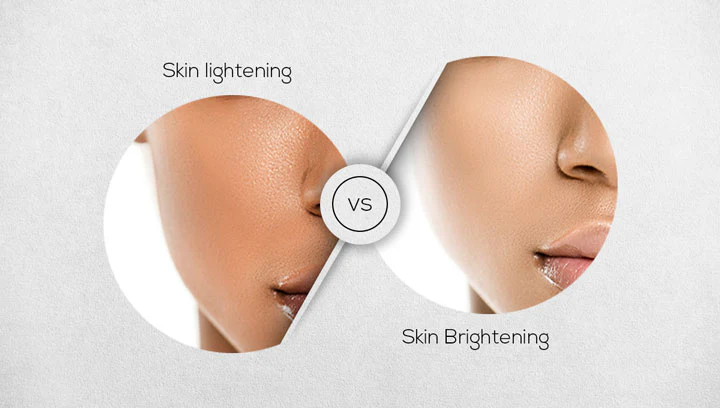Skin Enlightenment vs. Skin Whitening: What’s the Difference?

Skin Enlightenment vs. Skin Whitening: What's the Difference?
What is the difference between skin brightening and skin whitening?
Great question! The terms skin brightening and skin whitening are often used interchangeably, but they actually refer to very different concepts — both in purpose and approach.
Here’s a breakdown of the key differences:
✨ Skin Brightening
Goal:
To enhance your skin’s natural glow and improve overall radiance by removing dullness, dark spots, and uneven tone.
How it works:
- Focuses on improving skin texture, hydration, and health.
- Targets issues like hyperpigmentation, sun damage, and uneven tone.
- Encourages cell turnover and exfoliation for a more luminous appearance.
- Usually involves vitamin C, niacinamide, AHAs, BHAs, and natural ingredients.
Results:
Healthier, radiant, and even-toned skin — but your natural skin color stays the same.
Common Products/Methods:
- Brightening serums
- Exfoliating masks
- Vitamin C creams
- Home remedies (like turmeric, aloe vera)
⚪ Skin Whitening
Goal:
To lighten the skin tone beyond its natural color — often by reducing melanin production.
How it works:
- Uses chemical agents that suppress melanin (like hydroquinone or strong bleaching agents).
- Sometimes involves aggressive treatments like chemical peels, injections, or laser therapy.
- May lead to side effects or long-term damage if misused.
Results:
Temporarily or permanently lighter skin tone, but it can be unnatural-looking and problematic.
Common Products/Methods:
- Bleaching creams
- Whitening pills/injections
- Strong chemical treatments
💡 Key Takeaway:
- Brightening = healthy glow + even tone (safe, natural, sustainable)
- Whitening = lighter skin color (controversial, often unsafe, and unnecessary)
What is the strongest skin whitening ingredient?
The strongest and most effective skin whitening (or brightening) ingredients are typically those that inhibit melanin production (the pigment responsible for skin color). Here are some of the most potent and commonly used ingredients:
🌟 Strongest Skin Whitening Ingredients
1. Hydroquinone (2%-4%)
- Mechanism: Inhibits tyrosinase, an enzyme involved in melanin production.
- Effectiveness: Very effective for treating hyperpigmentation, melasma, dark spots.
- Caution: Long-term use can lead to ochronosis (a bluish-black discoloration); banned or restricted in some countries.
2. Kojic Acid
- Mechanism: Inhibits tyrosinase and acts as an antioxidant.
- Effectiveness: Effective for skin lightening, often used in 1-2% concentrations.
- Bonus: Derived from mushrooms or fermented rice.
3. Alpha Arbutin
- Mechanism: A stable form of hydroquinone derived from bearberry plant; slows melanin production.
- Effectiveness: Gentler alternative to hydroquinone, good for long-term use.
- Safe for sensitive skin.
4. Tranexamic Acid
- Mechanism: Inhibits UV-induced pigmentation and melanin synthesis.
- Effectiveness: Especially good for treating melasma and stubborn pigmentation.
- Often combined with Vitamin C or niacinamide.
5. Vitamin C (Ascorbic Acid)
- Mechanism: Antioxidant, reduces melanin and protects skin from UV damage.
- Effectiveness: Great for overall brightness and evening skin tone.
- Best used in 10%-20% concentrations.
6. Niacinamide (Vitamin B3)
- Mechanism: Reduces the transfer of melanin to the surface of the skin.
- Effectiveness: Good for brightening and improving texture, anti-inflammatory.
- Also great for acne-prone skin.
🔥 Most Potent Overall?
Hydroquinone is considered the strongest in terms of potency, but it must be used under medical supervision due to side effects.
For safer, long-term brightening:
- Alpha Arbutin + Vitamin C + Niacinamide is a powerful combo.
Which is better for skin whitening collagen or glutathione?
Great question! Both collagen and glutathione are popular in skin care and supplements, but they serve very different purposes, especially when it comes to skin whitening.
🧪 Glutathione vs. Collagen – Skin Whitening Showdown
✅ Glutathione – For Skin Whitening
- Primary Function: Powerful antioxidant; neutralizes free radicals and reduces melanin production.
- How it Works: Converts melanin from dark (eumelanin) to light (pheomelanin), leading to a gradual lightening of skin tone.
- Forms: Oral pills, IV, sublingual, and topical (though topical is less effective).
- Results: Noticeable whitening over time (usually 2–3 months with consistent use).
- Bonus: Also supports liver detox and improves skin clarity.
✔ Verdict: Best for skin whitening. Backed by science and widely used for brightening treatments.
💧 Collagen – For Skin Firmness & Anti-Aging
- Primary Function: Supports skin elasticity, hydration, and reduces wrinkles.
- How it Works: Replenishes the skin’s structural proteins, making it firmer, smoother, and more youthful.
- Forms: Powders, drinks, capsules, injections.
- Results: Better skin texture and elasticity, but no direct whitening effect.
- Bonus: Supports joints and overall skin health.
✔ Verdict: Great for skin health and anti-aging, but not effective for whitening.
🥇 Final Verdict:
| Goal | Best Choice |
|---|---|
| Skin Whitening | ✅ Glutathione |
| Skin Firmness | 💧 Collagen |
💡 Pro Tip: For best overall skin glow, many people combine glutathione + collagen + vitamin C. Vitamin C helps boost both collagen synthesis and glutathione activity in the body.